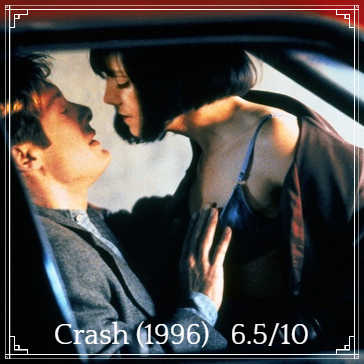Crash (1996) + Viggo Mortensen and David Cronenberg Chat (2019)
Last night I had the absolute pleasure of attending a TIFF special viewing of Cronenberg's highly controversial Crash, hosted by Viggo Mortensen, and followed by a discussion by him with Cronenberg himself, who surprised the audience with an unannounced appearance at the theatre.The night was started with some interesting words by Viggo that helped to set the audience for the viewing (especially for those that, like myself, had not seen Crash before). In talking about Crash and Cronenberg, Viggo said one of his favourite things about the director is that, in his films, Cronenberg never tells the viewer what to think. Unlike many films today, Cronenberg's films usually do not have the moralistic objective or cathartic ending, delivering to the audience a specific and intended message by the filmmakers. I found this a particularly interesting statement coming from Viggo as his recent, highly-acclaimed Green Book clearly would fall into the latter category of telling the viewer what to think...
Following these words was the viewing of Crash. For those that have not seen or heard of it, suffice it to say that the film is not for everyone. (Viggo made some entertaining cracks after the screening about his surprise of how much of the audience was still remaining in the theatre.) The film was notoriously banned in several countries, and its release was attempted to be stopped by its own studio. In simple words, Crash is an explicit look into a small counter-culture group of people who have an erotic attraction to car crashes. The film follows James Ballard (in reference to original author J.G. Ballard), played by James Spader, who, following a violent vehicle accident of his own, is introduced to and slowly integrated into this peculiar and, often, disturbing group of people. From its opening shot and onward, the film is absolutely brimming with gratuitous sex and violence both as seen through the lens of car crashes. The depiction of both and the cold and detached way the film portrays the intersection of them is in a way that is often uneasy and difficult to watch. The film is nevertheless a fascinating and explicit look into a very niche subculture of our society that those who are fans of Cronenberg will surely find something to attach to.
As mentioned, following the viewing the audience was delightfully surprised with the appearance of the master of bodily horror himself, David Cronenberg. The ensuing discussion between he, Viggo and TIFF's, Cameron Bailey, was one of the most enjoyable film-related discussions I have ever been a part of. Viggo has starred in three of Cronenberg's films and it was very evident that the two are close friends now. In fact, Cronenberg has an acting part in Viggo's soon-shooting directorial debut where he will be playing a proctologist (a fact that the two joked much about). I had not actually heard Cronenberg speak before and so it was very interesting to see that he is very much a humourous and self-aware individual, which may, on the surface, seem strange compared to the dark nature of his films. With regards to Crash specifically, he said that when the project was first introduced to him he was unable to get through reading the Ballard novel because of its disturbing content and nature. As such, he had no intention of adapting in to film and that idea only settled in much later.
The night continued with fascinating tidbits and great comedic banter between the two cinema legends. Cronenberg picked up Viggo's earlier discussion regarding his way of not telling the audience what to take away from his films. He said that often he does not have any particular objective in any of his films but simply wants to tell an engaging story. He provocatively compared this to Hitchcock who he said referred to himself as the 'marionette' because of the way he was able to perfectly pull the strings in making his audience feel very specific emotions through his films. There was an amusing back-and-forth following an audience question to Viggo about whether he has struggled in breaking away from his role of Aragorn following LOTR. Viggo suavely responded with humour as opposed to dismissing the somewhat poor question (considering he has had a clear plethora of diverse and acclaimed roles since LOTR, including his very recent Best Actor nomination...). Cronenberg helped to jump in here and poke fun at his friend, saying that he actually often mixed up calling Viggo Aragorn on-set while shooting together, kind of like an elderly uncle might do with his nephew. It was a truly entertaining night listening to the two men go at it with one another while also hearing insightful observations about cinema and their shared and independent histories in the industry.


Comments
Post a Comment